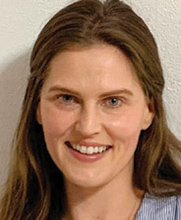Getting What I Need
Attention Magazine October 2021
The Factors That Changed My Life
 Dear Reader: The point of this story is to share that sometimes the weird, unexpected things in our lives come together to be greater than the sum of their parts. Or, perhaps the simpler way of putting it is this: if my life thus far had a song, it would be “You Can’t Always Get What You Want” by the Rolling Stones. My distractibility, caused by my ADHD, has often been the “behind-the-scenes influence” and has not always allowed me to get what I want.
Dear Reader: The point of this story is to share that sometimes the weird, unexpected things in our lives come together to be greater than the sum of their parts. Or, perhaps the simpler way of putting it is this: if my life thus far had a song, it would be “You Can’t Always Get What You Want” by the Rolling Stones. My distractibility, caused by my ADHD, has often been the “behind-the-scenes influence” and has not always allowed me to get what I want.
I was a fresh-faced college graduate in 2010, at the height of the recession. Need I say more? Oh, but there is more!
College was not easy for me. I was an excellent test taker, and pressure motivated me. However, I struggled beneath the weight of simply balancing papers, readings, and other deadlines. Then, I was also trying to figure out what I wanted to do as a career. All of this was too much of a challenge and quickly overwhelmed my silly ADHD brain.
Through my college internship, I met Chris, a friend who encouraged me to move to San Francisco. He recommended I work for the recruiting agency where he was employed. I took the bait. I thought, “Who wouldn’t want to move to warm, sunny California for a CAREER?!” Little did I know how cold and foggy San Francisco really is and, incidentally, how jobs opportunities could mirror the bleak landscape.
That said, to this day, I credit my first bosses, Mark and Jessica, for teaching me the techniques I still utilize today as a business owner: giving five percent more, honesty, prioritizing helpful feedback, and responsiveness to your candidates. And, of course, I credit Chris for taking a chance on me.
As I look back over my eleven-year career in recruiting, I’m proud of what I built. To an outsider, it might not seem like I created much; I never worked for Google (although I got an interview!), Facebook, Apple, Amazon, Netflix, or any of the other name-brand tech companies for which San Francisco is famous.
For me, the most compelling line of “You Can’t Always Get What You Want” has been the second part: “But if you try sometimes, you get what you need.” As a neurodivergent person, I haven’t always known what I’ve needed.
As previously mentioned, I was naive. I believed that my road to success would be paved with things like “mentors” and managers who “cared about me.” For the majority of my career, neither of these things would be true.
Instead, I found myself knee-deep in the world of “figure it out or get let go.” And I was “let go” more than once! I’ll never forget some of the examples from my own career. There was the time I made twelve more hires than the next closest recruiter at my company, and was let go because my boss didn’t like me due to my distractibility and nonstructured processes for hiring. I had created several nonlinear approaches to hiring, and it helped me to be more effective with candidates and resulted in many more hires, but it wasn’t enough and it wasn’t what mattered to this manager. Or the time at another company where I proved through emails, texts, and documents that our recruiting software had misattributed my hires to my teammate, and despite the many hours I had put into this company, including working until midnight more than once per week, was still denied a raise and let go.
I ask myself what changed because I never did find that all-knowing mentor, but I did find a road to self-acceptance, fulfillment, and my definition of success.
It took slowing down and identifying my needs, which was a new concept for me. I had always accepted the job offered to me.
This isn’t an article where I say, “I have all of the answers,” because I don’t. But if you read this looking for help, I can share three of the biggest factors that changed my life. The list is longer—but for brevity’s sake, here are the top three.
Friends and colleagues
The road I am on today, which feels authentic and purposeful, was paved with the help of many people who freely—sometimes for pay—invested in my success. There are many like Chris, who took a chance on me when I was young and inexperienced. There is the group of friends who helped me out of times of unemployment that felt like gaping, soul-crushing holes, listened to me cry, validated my feelings, and helped me come up with a plan. You have people in your life who want to help you with your career. And, if you can’t think of anyone specifically, I am here.
Therapy
For my growth as a human, EMDR was life-changing. I overcame personal and professional trauma, much of which was caused and influenced by ADHD. I was, and am truly able to see my skills and not just focus on my shortcomings. Therapy allowed me to see that while taking ownership for your actions is important, it’s unhealthy to habitually take more than your share of responsibility.
A good partner
I have a partner who gives and forgives: Marco. A good partner can help you see your blind spots, and gently (emphasis on gently) help you work to change. They allow you to do the same in return. Much like my career, I had to work on myself before I found this person.
I also learned these three practical tips that helped me avoid roles that were not a good fit for my ADHD.
- Before accepting the first job you’re offered, as we are wont to do, it’s important to recognize your specific needs. I do this by pinpointing my three “must-haves.” Your requirements will be different than mine and could include a minimum salary, certain hours of work, or a specific management style.
- Identify the three “dealbreakers” that you can’t have in your next role. Knowing what doesn’t work for you is equally important as recognizing your needs. By naming and knowing your dealbreakers, it will become simpler to identify environments that don’t fit your needs while interviewing, instead of realizing that a job doesn’t work for you after starting in a new role. Some common dealbreakers could include: a micromanager, a nonflexible schedule, the need to be in the office every day, very rigid processes that only allow work to be done in one way and limit creativity, endless meetings, and a weak vacation program.
- Ask questions to find out the company’s stance on your dealbreakers and must-haves. For example, if you are not an early riser, a great question to ask might be: “What time do employees start and end their day?”
In 2017, alongside my corporate recruiting position, I started career coaching with a collective. Nothing made me feel better than helping people navigate and avoid the career pitfalls and the caves I had found myself in. Seeing the fruit of my advice—more money, less stress, career fulfillment for the first time—made me want to stop focusing solely on the transactional nature of recruiting.
In 2019, I moved out of my wonderful apartment in Oakland, California, something I never thought I would do, to move to Europe. Through years of work, I created the boundaries so that my life did not revolve around seventy-hour work weeks spent recruiting on behalf of companies that would never fully appreciate me or my efforts.
In 2021, I again did something I filed under “things I never thought I could do.” I broke out on my own, and opened my career coaching company! Inspired by my workplace challenges (and pain), I decided to focus on helping womxn with ADHD find the same career fulfillment I had found.
I am proud to say that the clients with whom I’ve worked during the 2020-present pandemic all have learned how to identify roles that fit their specific needs, and have found new jobs where—most importantly—they feel appreciated for their skills and abilities and not judged for having ADHD.
When I look back at the pain of being put on a performance improvement plan, of being accused of wanting my boss’s job, of being let go, I realize that the Stones had it right: it made me who I am and allowed me to “get what I need” as a person with ADHD.


 Former in-house recruiter Sarah Frank spent a decade hiring for every role known to humankind, and then some more. She now runs an ADHD-focused career coaching service where she helps people, and especially womxn, find roles where they can be their authentic selves and get paid more money while doing it. In her spare time, she enjoys watching Warriors basketball, identifying the best patios for an aperitivo, snuggling her nephews, and attempting to speak Italian.
Former in-house recruiter Sarah Frank spent a decade hiring for every role known to humankind, and then some more. She now runs an ADHD-focused career coaching service where she helps people, and especially womxn, find roles where they can be their authentic selves and get paid more money while doing it. In her spare time, she enjoys watching Warriors basketball, identifying the best patios for an aperitivo, snuggling her nephews, and attempting to speak Italian.